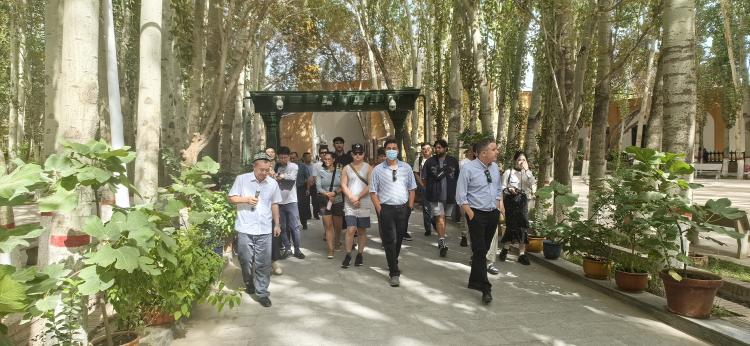"It was life-changing. We kept saying we ran out of adjectives to describe this trip. Seeing things in context informs a reality that's so different from what we often hear."

Group at the Kashi Id Kah Mosque
That was the reaction of Master of Arts in Human Rights and Social Justice student Michelle Raglin, who was one of 11 students from Thompson Rivers University (TRU) who just returned from a study tour of China.
Led by Associate Professor Robert Hanlon and Transnational Education Co-ordinator Staffen Liu-Calver, the 11-day study tour took students through Beijing, Tianjin and the Xinjiang Uygur Autonomous Region. The tour included a mix of cultural immersion, academic exchange and firsthand exposure to China's rapid development, with stops at iconic cultural sites such as the Forbidden City, Tiananmen Square and the Great Wall, and visits with long-standing partner institutions like Tianjin University of Technology (TUT).
"We've spent a lot of time talking about development and human security and how they've changed. These topics were explored in the many places we visited and with the many voices we were introduced to," said Hanlon.
The tour took place at a time when Canada-China relations have faced challenges. But meeting face-to-face with others from different cultures and countries helped build understanding during the educational exchange.
One of the few groups of Canadian university students to explore the Xinjiang region in recent years, the TRU students gained insights into the area's ethnic diversity, economic development and trade dynamics.
"Meeting with Uyghur people and understanding their lives and socioeconomic issues was eye-opening," said graduate student Gurinder Purewal. "It showed how complex narratives can be in different countries."
For some students, the trip sparked a newfound interest in international studies and Canada-China relations, and even educational opportunities in China.
"It opened my eyes to the different opportunities to go abroad and study," Purewal said. "This showed we have opportunities to learn and grow in other places, and going international for another placement can add diverse perspectives and challenge your own comfort zones."
"We wanted this trip to be a balance of education, cultural sites, university tours and exposure to economic development," said Hanlon, adding he hopes the study tour could be repeated, and possibly become an annual or bi-annual field school in China.
"We're committed to making international mobility more accessible and comprehensive for our students. By facilitating these opportunities, we're not just broadening horizons, but equipping our students with the cross-cultural competencies essential for success in today's interconnected world," said Baihua Chadwick, TRU vice-president International.
The study tour was organized with the assistance of the Office of the Consul General, Consulate General of the People's Republic of China in Vancouver.










